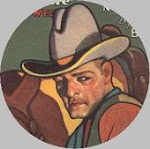This is the second novel by Patten the The Woodstove Whittlers and Wrangling Association read.
(Once an Association member finds something he likes, he sticks with it. For example, Sam Strange, Jr., has a short, hanging shelf with fourteen Louis L'Amour books on it -- thirteen stand upright from one end of the shelf to the other, and the fourteenth lays on top of the others, because Sam didn't like the idea of having thirteen of anything in his bedroom because of the possibilities of bad luck might ensue. Anyway, whenever Sam finishes reading those fourteen L'Amour books, he starts over reading them again. Because he likes L'Amour and sees little reason to travel beyond what he knows he already likes. And even though Louis L'Amour wrote more than fourteen books, Sam has only fourteen because that's how many fit on his shelf. Well, really, only thirteen fit, but we've already coddled that bit of Sam's strangeness.)
Again, as the WWWA noted about The Cheyenne Pool, The Youngerman Guns is a good, solid western. This one is about Dan Youngerman (what’s with the name Dan? see the Association's notes on The Cheyenne Pool), a deputy in a small town for the past seven years, who (unknown to the townsfolk) is also related to the leader of the dreaded Youngerman gang. Patten clearly bases the Youngermans loosely on the actual James-Younger gang -- as reflected in the “Youngerman” name. Dan had split with his vicious brother Sam during the Civil War after the infamous raid in Lawrence, Kansas. Sam vowed to kill Dan after the war when Dan married Sam’s childhood sweetheart.
(The Association's discussion of Sam's desire for vengeance was rather muted, and more than one member cut a surreptitious glance around the woodstove at Waldo Grinter and Adolphus Husky, for Adolphus was known to be sparkin' Jeanette Curry before he went off to join the Army as a young man; Waldo took up with Jeanette and they were married before Adolphus returned home. More than once we'd heard Adolphus complain that he wouldn't be hearing comments from his wife, Renee, about his belt size if he were married to Jeanette. So things were on the cusp of being skittery while talking about Dan and Sam Youngerman, but neither Adolphus nor Waldo got twitchy, and discussions remained civil and calm. All the same, a couple of the boys remarked to me afterward they were glad the Association was done with this book.)
Back to Patten's novel. Dan learns that the gang plans to raid his small town and rob the bank -- and perhaps kill Dan in the process. The townspeople learn of Dan’s relationship to the gang, and their fear and indignation lead to some ugly scenes all the way to the big shootout at the book’s climax. [A note from the Top Hand: More than one of Patten's books have that High Noon scenario, with a lone man wronged or wrongly judged by a (usually self-righteous) crowd. Although the situation appears more than once in his work, Patten handles it nicely each time, and there's no sense of deja vu.]
This Patten novel offers a solid tale. I could imagine both it and The Cheyenne Pool as the basis for a couple of fine B-western films during the 1960s. (Surprisingly -- when you take into consideration how prolific Patten was -- the IMDB site lists him for only four entries.)
Overall, the Association readers were pleased with this novel, and likewise pleased that no real disruptions popped up during the course of the gab session. More than one member noted, however, that Adolphus and Waldo didn't line up for the snack table together, nor did they sit on the same side of the room. But before the meeting broke up, Waldo complimented Adolphus on his new belt buckle from the Corn Palace Stampede Rodeo, and Adolphus recommended a new brand of feed for Waldo's veal calves.
Sometimes life is funny; sometimes it's hard as a Montana blizzard. Mostly, life just is.
Subscribe to:
Post Comments (Atom)






3 comments:
Sounds like great entertainment.
I'm not familiar with Patten but I'm certainly familiar with L'Amour. Yes, there's more than 14 and I've read them all several times.
To me, the most important thing is the entertainment. If some true history (or geography) can be included, that's even better
Dave
www.dmmcgowan.blogspot.com
It's amazing how many readers don't "travel beyond" Louis L'Amour. Many other writers of L'Amour's time can provide David's all-important entertainment, along with the true history and some geography. Patten is surely one of those writers.
Maybe potential readers don't come across the other writers simply because the bookstores won't give them the shelf space they've always given L'Amour.
(Enjoyed Duane's association framing of this review, by the way.)
I think it is a generation thing with Louis L'Amour. Anyone about twenty years younger than me would have found the shelves crammed with his books (rather like Mozart dominates the classical music shelves).
They didn't grow into L'Amour because he was already there. Many others who are a tad older cut their teeth on the likes of Luke Short, W.C.Tuttle - even V.Joseph Hanson and Oliver Strange before we noticed L'Amour. Lewis B. Patten would be in the mix too.
Come the Seventies there is J.T.Edson and The Piccadilly Cowboys and when they had passed through there was only one writer left on the shelf.
Well, that's the way I read the history.
Post a Comment